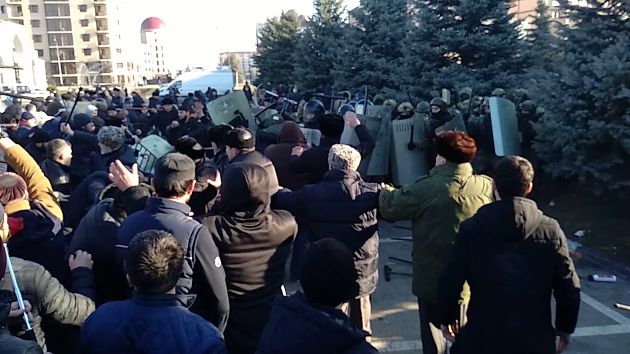What is the similarity between the current situation in Ingushetia and the situation in the rest of Russia, and what is the difference?
The similarity lies in the power, which is alien to society, hostile, unwilling to listen and hear it, aggressive, self-satisfied and unpunished. The difference lies in society itself. In most of the territory of the Russian Federation, if society is not satisfied with such an attitude of power towards itself, it obediently tolerates it, believing that nothing can be changed. And even in the vaunted advanced centers such as Moscow, St. Petersburg, or Ekaterinburg, only a tiny fraction of the population is currently ready to behave differently.
As a result, civil protest in Russia is weak and its participants are intimidated. This, for example, is a typical protest rally in the Russian capital and the police response to it. Mostly young, educated people, many girls. The police deliberately pick out particularly problematic individuals from the crowd and take them away in police vans, while the others do not resist.
And this is what happened today when the police tried to break up a protest rally in Magas, Ingushetia. A crowd of middle-aged men and young people stands in the way of the police and resists with improvised means. The authorities and security forces do not confront them, but the protesters show restraint. Their leaders were informed that in 10 days the streets of Magas would be able to host another mass protest rally, after which they triumphantly, with a sense of their own dignity, dispersed and left.
The attitude and thoughts of those gathered this time were, in our opinion, perfectly expressed by one of the protest leaders, the well-known Ingush human rights defender Magomed Mutsolgov. Here is his short, dare I say, programmatic speech.
And again, what stands out? The leaders of the Russian opposition are constantly trying to assure us all that secularism, individualism, feminism, and other “progressive values” are the conditions for democracy and civil society. However, they seem to have some difficulties with democracy, civil society, and their defense. On the contrary, the very factors that they constantly present as obstacles to civil society and democracy: religiosity, clan identity, patriarchal nature, allow the society based on them to fight for its rights, from cohesion to demography, which plays a significant role in this.
Thus, as we can see, it is not the “advanced” Moscow and St. Petersburg, but the “archaic” Ingushetia that is ultimately at the forefront of civil society’s struggle for self-respect and control over a power that has lost its way.

